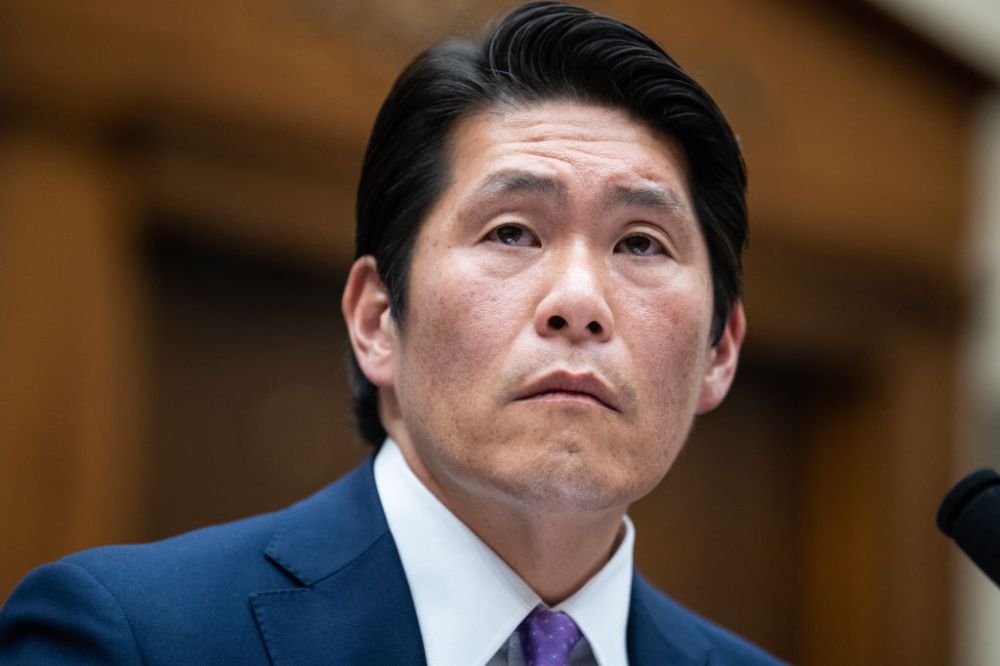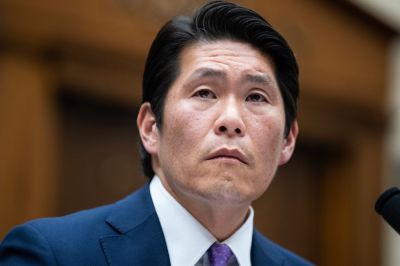Welcome back to a briefer-than-normal Collision, where we look a little closer at the testimony former special counsel Robert Hur delivered to the House Judiciary Committee this week.
The Docket
- A new filing from Donald Trump’s legal team provides some insight into the former president’s defense in his upcoming Manhattan criminal trial. Trump will not invoke the “advice of counsel” defense, according to ABC News, meaning he won’t formally say that his alleged criminal actions were done at the advice of his lawyers at the time. But the filing does lay out how Trump’s team plans to argue that he “lacked the requisite intent to commit the conduct charged in the Indictment because of his awareness that various lawyers were involved in the underlying conduct giving rise to the charges.” (In other words, he didn’t intend to do anything he’s accused of and he thought the lawyers were handling it.) The trial, dealing with whether Trump falsified business records related to hush money payments to Stormy Daniels, is set to begin March 25.
- Fulton County Judge Scott McAfee issued an order Wednesday striking six of the criminal counts against Trump and several of his co-defendants in the Georgia election-interference case. The quashed counts all relate to the defendants’ alleged soliciting of Georgia elected officials to violate their oaths of office—charges McAfee says Fulton County District Attorney Fani Willis’ team has failed to provide sufficient detail on. McAfee’s ruling does not throw out any of the counts dealing with the “corresponding overt acts,” which is to say, the steps co-defendants are alleged to have taken to further their conspiracy. Willis may appeal the ruling.
- One of the unidentified Mar-a-Lago employees referred to in the classified-documents indictment of Trump has come forward to defend the prosecution of his former boss. Brian Butler spoke exclusively to CNN earlier this week to say that he does not believe the case against the former president is a “witch hunt.” Butler revealed himself as “Trump Employee 5” in the indictment and claims that he unwittingly helped Trump aide Walt Nauta, a Trump co-defendant, move boxes that contained classified documents.
- Trump himself appeared in court in Florida on Thursday during a daylong hearing as Judge Aileen Cannon listened to arguments to throw out some or all of the charges in the classified-documents case. Attorneys from special counsel Jack Smith’s team rebutted Team Trump’s argument that the former president had used his declassification powers to alter the documents’ classification.
- We have a trial date for Hunter Biden on the federal gun charges he faces, CNN reports. Judge Maryellen Noreika set the trial to begin in Delaware on June 3. Special counsel David Weiss charged Biden with lying about his drug use on forms used to purchase a firearm. Weiss also has charged Biden in California on tax charges, with the trial tentatively scheduled to start there on June 20.
The Hur-t Locker
Robert Hur, the recently departed special counsel investigating President Joe Biden’s retention of classified documents, testified before the House Judiciary Committee Tuesday, at the same time that the transcript of the five-hour interview between Biden and Hur’s team was released. And, like most things coming out of Congress these days, the whole ordeal was more noise than light. Hur clearly went into the hearing understanding that this was a game of partisan Ping-Pong—and he was playing the role of the ball.
Democrats made statements masking as questions intended to make the point that Biden did not have memory lapses, that the special counsel wrote his report for the purpose of helping Donald Trump defeat Biden, and that Trump’s actions were way worse. Republicans, on the other hand, wanted Hur to acknowledge that President Biden should have been charged, that Biden doesn’t remember what planet he lives on, and that the charges against Trump should have been dropped yesterday.
Hur’s job, however, was to defend his report, and he began by reminding the committee members that a prosecutor must satisfy three prongs before bringing charges: He must believe the person is guilty beyond a reasonable doubt, he must believe that he has the evidence to prove the person is guilty beyond a reasonable doubt, and he must believe that it is more likely than not that a jury would convict the person. Therein lies the rub. Hur, in his report and in his testimony, said he believed that there were several reasons a jury would not convict what would by that point be former President Biden. One of those reasons was that they would believe Biden when he inevitably argued that he didn’t remember that he had the classified documents in his residence.
Here’s what’s incoherent about the political responses to Hur’s report. Democrats argued that the special counsel was just wrong about Biden’s memory lapses and that no reasonable jury would have believed he couldn’t remember the documents were in his basement. Taken to its logical conclusion, Democrats seem to be arguing that therefore Biden should have been indicted. And if Hur had wanted to hurt Biden, as many of the Democrats on the panel suggested, he had more than enough evidence just to recommend charging him—a far more politically damaging outcome. Is Hur waiting for his Trump judicial appointment, as one Democrat insinuated? Unlikely. Hur oversaw the Mueller investigation into Donald Trump! Trump, as you may recall, was not favorably disposed toward the people involved in that event.
And on the other side, Republicans tried repeatedly to make the point that the Biden and Trump cases were too similar to have different outcomes—one indicted and one not. And we should all expect Trump to use several of the defenses that the Biden team used as highlighted in the special counsel’s report. But let’s be serious here. Trump is charged with obstruction of justice. Not only are those charges rock solid, but the same evidence can also be used to prove Trump acted willfully in retaining the documents. Remember: Trump is not charged with taking the documents in the first place. He’s charged with keeping them after it was clear that he knew he had them.
There was certainly some evidence in the special counsel’s report that Biden also knew he had national security information in his possession and kept it anyway. But it pales in comparison to the evidence that they have on Trump’s state of mind. And Republicans who pressed Hur on how he should have recommended charges against Biden also seemed to miss the logical conclusion of their argument. If Biden’s conduct justified charges, the charges against Trump must also be solid.
And then there is the public, which now has access to the transcript. We won’t tell you what to think. Fair-minded people can reach their own conclusions about Biden. There are certainly instances where the president clearly has trouble remembering pertinent details of his life. (And, of course, in the press conference he gave after the release of the report, President Biden forgot pertinent details of the interview itself.) There are other times where his memory seems just fine. But Hur’s job wasn’t to decide whether Biden had the mental acuity to serve another term. That’s our job as voters. Hur’s job was to decide whether he could win a case at trial. As he put it on Tuesday:
The evidence and the president himself put his memory squarely at issue. We interviewed the president and asked him about his recorded statement, “I just found all the classified stuff downstairs.” He told us that he didn’t remember saying that to his ghostwriter. He also said he didn’t remember finding any classified material in his home after his vice presidency. And he didn’t remember anything about how classified documents about Afghanistan made their way into his garage.
My assessment in the report about the relevance of the president’s memory was necessary and accurate and fair. Most importantly, what I wrote is what I believe the evidence shows, and what I expect jurors would perceive and believe. I did not sanitize my explanation. Nor did I disparage the president unfairly. I explained to the attorney general my decision and the reasons for it. That’s what I was required to do.
Sarah’s View
Frankly, the circus around the Hur testimony was all pretty depressing. It is true what they say: Democracy is the worst form of government except for all those other forms that have been tried from time to time.
In short, Hur wrote the report the way he did because those were the facts as he found them, and under DOJ regulations, he owed the attorney general a confidential memo laying out his reasons—all of his reasons—for not bringing charges. In that sense, he sounded a lot like what we say we want from journalists but what partisans are rarely willing to accept: all the facts, not only the facts that fit a narrative, and an honest assessment of those facts without concern for whom it may help or hurt politically.
And for that reason, Steve Hayes and Jonah Goldberg have named Rob Hur our Dispatch Mascot of the Week. Congrats, Rob, I hear it comes with a “Naw Dawg” mug.








Please note that we at The Dispatch hold ourselves, our work, and our commenters to a higher standard than other places on the internet. We welcome comments that foster genuine debate or discussion—including comments critical of us or our work—but responses that include ad hominem attacks on fellow Dispatch members or are intended to stoke fear and anger may be moderated.
With your membership, you only have the ability to comment on The Morning Dispatch articles. Consider upgrading to join the conversation everywhere.